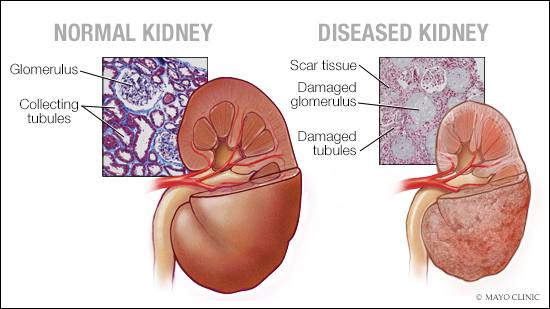About 15% of adults in the U.S. are estimated to have chronic kidney disease — that's about 37 million people.
What if those people could be treated with medication that could slow the progression of their disease, and help avoid the need for dialysis and kidney transplantation altogether?
Dr. Naim Issa, a Mayo Clinic transplant nephrologist says there is a class of medications to help people with chronic kidney disease that does just that. He says Mayo Clinic has been incorporating these medications to help patients for the last few years.
March 9 is World Kidney Day, a day aimed at raising awareness about the importance of the kidneys.
Journalists: Broadcast-quality video (1:03) is in the downloads at the end of this post. Please courtesy: "Mayo Clinic News Network." Read the script.
Most people don't have symptoms of chronic kidney disease until it's at an advanced stage.
"Early detection of chronic kidney disease may help us actually treat and prevent patients ahead of time before the need for dialysis or kidney transplantation," says Dr. Issa.

He says a new class of drugs, SGLT2 inhibitors, is being called a game changer. The drugs were originally designed to treat diabetes — a main cause of chronic kidney disease.
Medicines in the SGLT2 inhibitor class include canagliflozin, dapagliflozin and empagliflozin.
"In large trials, we observed groundbreaking success with those medications in slowing down the progression of chronic kidney disease, to the extent of avoiding dialysis and the need for kidney transplantation," Dr. Issa says.
The medications are used whether the patient is diabetic or not.
"They are actually game-changer medications that help us prevent the progression of chronic kidney disease," says Dr. Issa.
You can help yourself by following a low-sodium, moderate-protein diet, avoid smoking and getting plenty of exercise.
Dr. Issa says it is important that patients with chronic kidney disease work with their primary care physician and health care team to monitor and check blood pressure, urine analysis and bloodwork.
Related posts:
- Lifestyle changes can be critical for kidney transplant patients’ long-term survival
- Mayo Clinic Minute: What is chronic kidney disease?
- Diets higher in calcium and potassium may help prevent recurrent symptomatic kidney stones, Mayo Clinic study finds
For the safety of its patients, staff and visitors, Mayo Clinic has strict masking policies in place. Anyone shown without a mask was recorded prior to COVID-19 or recorded in an area not designated for patient care, where safety protocols were followed.







